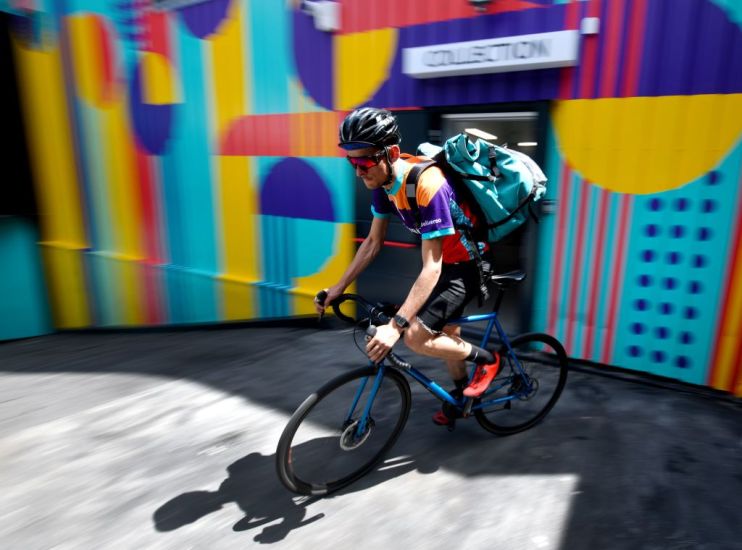Will rapid delivery apps maintain post-pandemic momentum?

Since the pandemic began, a slurry of quick delivery apps have emerged with the same promise to deliver food within 30 minutes, while the pandemic made supermarkets an even more costly chore.
The pandemic pushed the pedal on rapid delivery apps like Weezy, Dija, Getir and Gorillas – a sector where a huge amount of capital lies waiting aside a small pool of customers.
Now that the UK is slowly shedding tiers of restrictions, alternative shopping models that have cropped up amid people less inclined to go to brick-and-mortar supermarkets may struggle to maintain their pandemic-induced momentum with the level of competition.
Octopus Ventures investor Rebecca Hunt told City A.M.: “If you look at online versus offline, there’s still arguably a huge amount more growth to go in the online food category and I think that’s why we’re seeing such a huge influx of capital, entrepreneurs and innovation happening in and around this space.
“This was definitely happening, but I think Covid has hugely accelerated that trend for obvious reasons.”
The shift to online has been felt by every business in the UK, with online shopping sales soaring by 48 per cent to nearly £113bn last year, according to Ofcom.
Although the market is lined up for more growth, selling food products alone may fail to carve out a strong enough customer base for those with capital at the ready.
Online food shopping
Weezy, what is thought to be the first on-demand supermarket pre-Covid, delivers across the capital, from Finsbury Park to Tooting and bagged £14.6m in funding earlier this year.
Alec Dent, chief operating officer and cofounder of Weezy, told City A.M.: “Basket sizes have grown during Covid, because it’s very easy to plan right now and you’re always at home to receive a next-day big delivery.
When asked how the company plans to keep post-pandemic momentum, Dent said that as restrictions ease and the on-demand lifestyle returns, apps like his will be a key port of call when juggling errands or on a night out.
“Having a service like Weezy, that comes as and when you need it, is actually much more convenient. Therefore, a lot of people currently shopping with Ocado will actually be moving to Weezy.”
With food and drinks retailers enjoying the biggest lift to sales, an 82 per cent leg up on 2019 levels, it is no surprise that so many entrepreneurs and investors have tried to capitalise on the market.
But with the number that are emerging and household goods surging 76 per cent in online demand according to Ofcom, selling more than food goods will be crucial to survival in the speedy delivery sphere.
“In order to make the economics work for the business in the longer term, that’s exactly what they will end up doing – offering a bigger variety of goods than just highly consumable food products to increase the basket and increase the audience as well,” Hunt explained.
Weezy, which began with groceries alone, now stocks board games like Uno and Monopoly, alongside first aid product,s as it tapped into the broader market to diversify its promise from other emerging startups.
“This is a £200bn market that’s very rapidly moving online, and I think it’s a good thing that the players are going to be quite specialised to certain customer segments,” Dent continued.
“I think the market will support many of these players, but it’s impossible to predict what will happen in the sector. Right now, there are a lot of supermarkets, and people go to all of them. I think the same will happen in this space.”
Climate-conscious consumers
However, the market has a lot of eyes to please. From investors looking for market longevity to customers seeking climate-conscious consumerism.
Environmental, social and governance (ESG) standards weighed heavily on Deliveroo’s initial public offering back in March, as the tech firm’s gig economy contracts spooked consumers and investors alike.
Weezy has dodged gig economy controversy by giving drivers worker contracts, meaning they are paid by the hour and not per delivery.
Appealing to higher ESG standards makes both environmental and economical sense, Hunt said, adding that: “The challenge with any category in food is the margins are really low…so getting the best quality, sustainable, responsibly sourced food is much more expensive and if your customers are price sensitive that can be a real challenge.”
But when food is not the only cash cow, companies like Weezy, which only use electric vehicles, can thrive in an ESG attentive, post-pandemic era – especially when selling cucumbers that are not wrapped with plastic.